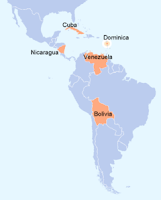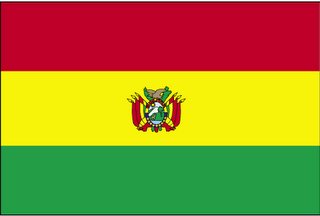Bolivia's Government Receives International Backing for Democratic Process
Meeting for the 6th ALBA Summit, a declaration signed by the Presidents of Nicaragua, Venezuela, the Vice President of Cuba, and the Prime Minister of Dominica stated approval for the change that the people of Bolivia “are pursuing through a constitutional process”.
The statement also condemned actions that seek discrimination, exclusion, violence and racism and those actions that aim to harm Bolivia’s unity.
It was one of seven declarations signed by President Morales and the heads of state on Saturday at the close of the economic summit which was convened to launch a new regional development bank and inaugurate ALBA’s headquarters in Caracas.
The ALBA is a regional integration effort that is the brainchild of Venezuelan President Hugo Chavez. It was founded as a counterweight to the U.S.-led Free Trade Area of the Americas.
 The regional body focuses on mutually beneficial trade based upon the idea of social, political, and economic integration between countries of Latin America and the Caribbean. The ALBA Bank will begin operating by year end and is expected to start with a constructive fund of $1 billion to $1.5 billion for development projects.
The regional body focuses on mutually beneficial trade based upon the idea of social, political, and economic integration between countries of Latin America and the Caribbean. The ALBA Bank will begin operating by year end and is expected to start with a constructive fund of $1 billion to $1.5 billion for development projects.Venezuela and Cuba were the initial members, with Bolivia joining in April 2006 and Nicaragua in January 2007. Dominica became the fifth ALBA member, and the first English-speaking Caribbean member, during the summit this weekend.
The special statement signed in support of President Morales and his administration follows closely on the heels of a previous declaration signed by the South American governments of Brazil, Argentina, Venezuela, Uruguay, Ecuador, and Paraguay at a Bank of the South (Banco del Sur) summit in December 2007.
Similar to the ALBA initiative, the Bank of the South will serve to counteract the economic influence of the International Monetary Fund and Inter-American Development Bank - development funds dominated by the U.S. and European Union.
Although Brazil and Venezuela are the regional leaders, Bolivia’s economy is performing strongly under the leadership of President Morales. Nationalizing Bolivia’s hydrocarbon sector generated $2 billion in surplus revenue during 2007. The nation’s economy grew at about 4 percent last year and is expected to retain that growth throughout 2008, but poverty rates still remain high.
The rush of funds has generated other economic and political consequences. Regional governors within Bolivia are ready to secede from the national government in order to protect their larger shares of hydrocarbon revenue that resulted from the nationalization. Bolivia's inflation rate still remains high at almost 12 percent, as the Boliviano rises against the falling dollar.
Given the looming recession in the United States and ongoing global economic volatility that threaten the economic health of Latin America, these regional funding initiatives may be arising at a pivotal moment to support the economic and political changes taking place throughout the region.
Labels: ALBA Bank of South Venezuela Chavez Dominica Morales










